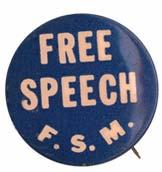 [[H I S T O R Y]] * On this date, 41 years ago--October 1, 1964--Jack Weinberg, an alumnus of the University of California, Berkeley, who had a record of American civil-rights activity and associated arrests, set up an information table on Sproul Plaza, near the corner of Bancroft and Telegraph avenues. That intersection, right on the edge of the university campus, had long been a spot from which leaflets were passed out, speeches calling for social change were made, and fundraising for student organizations was conducted. But after a year of Bay Area civil-right demonstrations calling for an end to racial discrimination by employers, and after student protests only months before at the Republican National Convention, held in San Francisco’s Cow Palace, the campus administration had announced that a ban on such activities would be “strictly enforced,” and no more leafleting or student organizing would be permitted at Bancroft and Telegraph. Despite complaints from student groups across the political spectrum, and rallies against this ruling, the administration refused to budge.
[[H I S T O R Y]] * On this date, 41 years ago--October 1, 1964--Jack Weinberg, an alumnus of the University of California, Berkeley, who had a record of American civil-rights activity and associated arrests, set up an information table on Sproul Plaza, near the corner of Bancroft and Telegraph avenues. That intersection, right on the edge of the university campus, had long been a spot from which leaflets were passed out, speeches calling for social change were made, and fundraising for student organizations was conducted. But after a year of Bay Area civil-right demonstrations calling for an end to racial discrimination by employers, and after student protests only months before at the Republican National Convention, held in San Francisco’s Cow Palace, the campus administration had announced that a ban on such activities would be “strictly enforced,” and no more leafleting or student organizing would be permitted at Bancroft and Telegraph. Despite complaints from student groups across the political spectrum, and rallies against this ruling, the administration refused to budge.Then, on the morning of October 1, Weinberg defied that ruling by manning a table at Sproul Plaza, sponsored by the Congress of Racial Equality (CORE). His was not the only such table; others promoted the Student Nonviolent Coordinating Committee (SNCC), the Du Bois Club, Students for a Democrat Society (SDS), and half a dozen other groups. Yet it was to the CORE table that an assistant dean of students marched that morning at 11 a.m., demanding that Weinberg identify himself. When he refused to give his name or show identification, the dean ordered campus police to arrest him. Police pulled a car onto the plaza and loaded Weinberg, who had gone limp (a standard civil disobedience tactic), into it. However, before the car could leave for security headquarters, it was surrounded by onlookers, who chanted “Let him go! Let him go!” and began singing the civil rights anthem, “We Shall Overcome.” And within a short time, hundreds more people gathered at the scene.
For more than 30 hours after that, Weinberg did not leave the campus police car, nor did that car move. Some 3,000 people filled Sproul Plaza to listen to speakers--many of whom used the vehicle as a podium, and some of whom had never thought to address a crowd before that day--spread their messages of hope and harmony and youthful determination. “Near midnight,” according to the Encyclopedia of American Social Movements, “about one hundred fraternity boys surrounded the few hundred students still there to heckle and pelt them with eggs and lighted cigarettes. They finally left after a Catholic priest pled for peace from the top of the car.”
This standoff did not stop until the next day, after a group of students, meeting with Berkeley President Clark Kerr (who was under orders from California Governor Pat Brown to find a peaceful resolution to this confrontation), negotiated an arrangement whereby Weinberg would be released without charges, and the fate of eight students who had previously been suspended for their campus political behavior was referred to a specially created committee.
Although participants couldn’t see it at the time, Jack Weinberg’s arrest and the “Berkeley rebellion” that followed, marked the start of America’s Free Speech Movement. It helped stimulate the radicalization of U.S. students during the 1960s, which led to anti-Vietnam War rallies, rioting at Chicago’s 1968 Democratic National Convention, and the shootings at Ohio’s Kent State University in 1970. It also, though, helped stimulate a continuing U.S. tradition of speaking out for or against causes of concern to the nation, be they women’s rights or the lies-based war on Iraq.
(Thanks to National Public Radio’s “Weekend Edition” for reminding me of this anniversary.)







No comments:
Post a Comment